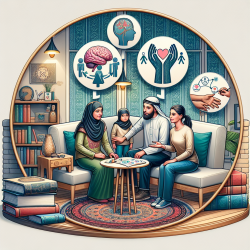Introduction
In the realm of speech-language pathology and allied health professions, the focus on data-driven decisions is paramount. The recent research article titled "Conducting research on building psychosocial support for Syrian refugee families in a humanitarian emergency" offers valuable insights that can significantly enhance the practice of professionals working with vulnerable populations, such as refugee families. This blog post aims to distill the findings of this research and suggest ways practitioners can integrate these insights into their work, ultimately improving outcomes for children and families.
Understanding the Context
The study was conducted in Istanbul, Turkey, where over 750,000 Syrian refugees reside. These families face numerous challenges, including limited access to mental health services, cultural and language barriers, and high levels of stigma associated with mental health issues. The research aimed to develop and pilot a novel intervention model called Low Intensity Family Support (LIFS) to address these challenges.
Key Research Findings
The research identified several critical challenges and strategies for implementing psychosocial support interventions in a humanitarian emergency setting:
- Building Partnerships: Establishing strong partnerships between academic institutions and humanitarian organizations is crucial for successful intervention development and implementation.
- Task-Sharing Approach: Utilizing a task-sharing approach, where interventions are delivered by trained lay service providers, can be effective in settings with limited access to specialist services.
- Cultural Competency: Understanding and integrating cultural values and practices into the intervention design is essential for acceptance and effectiveness.
- Community Collaboration: Engaging community members and leveraging their experiences can enhance the relevance and impact of interventions.
Implications for Practitioners
Practitioners working with refugee families can draw several lessons from this research to improve their practice:
- Adopt a Family-Centered Approach: Interventions that focus on family resilience and communication can lead to better outcomes for both children and adults.
- Embrace Multidisciplinary Collaboration: Working with professionals from various fields can provide a more comprehensive support system for families.
- Focus on Capacity Building: Investing in the training and development of local practitioners can enhance the sustainability and scalability of interventions.
Encouraging Further Research
While the study provides a solid foundation, there is a need for further research to refine and expand these interventions. Practitioners are encouraged to engage in research activities to explore new methodologies and adapt existing models to different cultural and contextual settings.
Conclusion
Incorporating the insights from this research can significantly enhance the quality of psychosocial support provided to Syrian refugee families. By focusing on family resilience, community collaboration, and cultural competency, practitioners can create meaningful and lasting impacts on the lives of these vulnerable populations.
To read the original research paper, please follow this link: Conducting research on building psychosocial support for Syrian refugee families in a humanitarian emergency.










